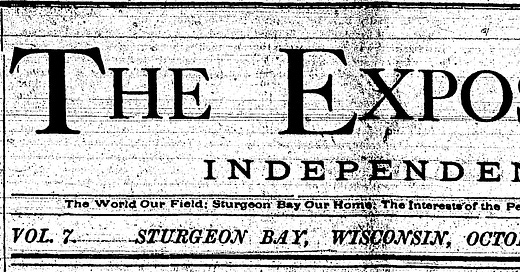Two articles on the charging of interest from the October 24, 1879 Expositor Independent
Authorities on Usury.
"The exaction of interest for the loan of money has been one of the greatest evils of the Roman commonwealth."
A DETESTABLE CUSTOM.
"The practice of receiving interest on money is detestable, as by it the increase of our fortune arises from the money itself and not by the employing it to the purpose for which it was intended."—Aristotle, Book II, Chap. I.
RECEIVE NO MORE THAN YOU GIVE.
Decretal, Gratian 14—Quest, 14, C. 1.—"If you lend your money to a man from whom you expect more than you gave, not money alone, but any other thing, whether it be wheat, wine, oil, or any other article; if you expect to receive any more than you gave, you are a usurer, and, in that respect, reprehensible, not praiseworthy." —St. Augustine on Psalm xxxvi. An. 405.
"Whatever is received above the principal lent, or that capital that was given, whether it be money or anything else that may be purchased or estimated for money is usury. For it is written in Ezechiel, 18: "Thou shalt not take usury and increase," and in Luke vi., 35, our Lord says: "Lend, hoping for nothing thereby." Even among the Gentiles usury was always considered a most grievous and most odious crime."
"NOTHING EXCEEDS IN BARBARITY THE MODERN SYSTEM OF USURY."
St. Chrysostom, Hom. 5, on Matt., says: "Nothing exceeds in barbarity the modern system of usury. Indeed, these usurers traffic on other people's misfortunes, seeking gain through their adversity; under the pretence of compassion, they dig for the distressed a pit of misery; under the pretence of giving aid, they grind the indigent; extending the hand to receive them into harbor from the storm, they allure him only to be shipwrecked upon the shoals and shelves of an unforeseen whirlpool."
There is nothing really more monstrous in any recorded savagery of absurdity of mankind than that governments should be able to get money for any folly they may choose to commit by selling to capitalists the right of taxing future generations to the end of time. All the cruelest wars inflicted, all the basest luxuries grasped by the idle classes, are thus paid for by the poor a hundred times over. And yet I am obliged to keep my money in the funds or the bank, because I know of no other mode of keeping it safe; and if I refused to take the interest, I should only throw it into the hands of the very people who would use it for these evil purposes, or at all events, for less good than I can. Nevertheless it is daily becoming a more grave question with me what it may presently be right to do. It may be better to diminish private charities and much more, my own luxury of life, than to comply in any sort with a national sin. But I am not agitated nor anxious in the matter; content to know my principle and to work steadily towards better fulfillment of it. —JOHN RUSKIN.
The Old Testament on Usury.
"If thou lend money to any of my people that is poor that dwelleth with thee thou shalt not be hard upon him as an extortioner, nor oppress him with usuries." EXODUS, XXII. chap., 25 verse.
"Take not usury of him, NOR MORE THAN THOU GAVEST. Thou shalt not give him thy money upon usury, nor exact of him any increase of fruits.—LEVITICUS, XXV. chap., 35 and 36 verses.
"And I rebuked the nobles and magistrates, and said to them: Do you every one exact usury of your brethren? and I gathered together a great assembly against them."—ESDRAS, chap. v., verse 7.
"Thou shalt not lend to thy brother money to usury, nor corn, nor any other thing. To thy brother though shalt lend that which he wanteth without usury that the Lord may bless thee in all thy works."—DEUTERONOMY, XXIII. chap., 19 and 20 verses.
Courtesy of the Door County Library Newspaper Archive
Charles Martin, the editor when this was published, also wrote an 1881 history of Door County: https://www.google.com/books/edition/History_of_Door_County_Wisconsin/9Fo0AQAAMAAJ?hl=en&gbpv=1
The author is not stated. The first article is from https://books.google.com/books?id=leUoAAAAYAAJ&pg=PA226 and the second article is apparently abridged from https://books.google.com/books?id=cNbXmmrM6oIC&pg=PA230. The author, Benjamin S. Heath, 1821-1887, labels the 2 Esdras passage above as being from Nehemiah; this is not incorrect: https://www.bible.com/bible/1/NEH.5.KJV
Martin may have reprinted the articles from a political circular. A search shows that the Kansas Daily Tribune printed this material in 1881; copying from a common source if not from the Expositor Independent.
It is unusual that ancient and theological texts are printed alongside of John Ruskin, https://www.britannica.com/biography/John-Ruskin. According to the brief summary at https://www.amazon.com/Labor-Finance-Revolution-Benjamin-Heath/dp/1166100502, Heath’s book was intended to make an economic and political argument. Heath was part of the Greenback movement, an antecedent of the Populist movement, and to support his advocacy he could have drawn from a more theologically oriented source.
Posts relating to churches:
https://doorcounty.substack.com/t/churches
Posts relating to honor or shame:
https://doorcounty.substack.com/t/honor-or-shame





